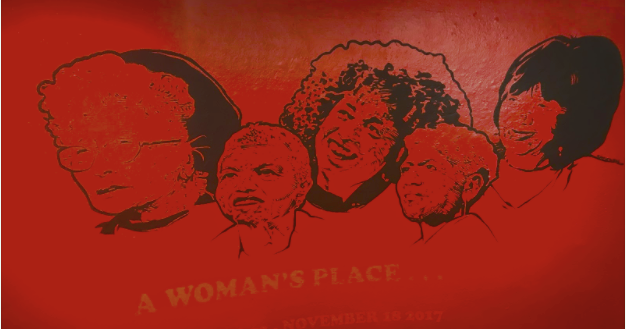Event Review: Mountains that Take Wing

Photo by Carla Gonzalez
The William Grant Still Arts Center screened “Mountains That Take Wing-Angela Davis & Yuri Kochiyama: A Conversation on Life, Struggles & Liberation,” a documentary featuring conversations between Angela Davis and Yuri Kochiyama between 1996 and 2008. Ami Motevalli, director of William Grant Still Arts Center and former student of Angela Davis, welcomed guests to the screening, which is a part of the exhibition “A Woman’s Place,” open until November 18.
Motevalli introduced Kochiyama as a ‘maternal figure’ in the Civil Rights Movement, from San Pedro, who transitioned through the U.S. Japanese Internment Camps. Throughout her life, Kochiyama wrote letters to political prisoners and organized events with figures such as the Freedom Riders. Davis is a political activist and professor who became a leader of the black liberation movement in the 1960s and 70s. Kochiyama and Davis kept in contact for over 13 years and decided to film their conversation.
How did Kochiyama keep herself motivated in her activist work? “People in the movement sustain each other,” Kochiyama responds. Davis adds, “activism isn’t special.” No longer is activism exclusive to carrying posters or hanging leaflets, with Kochiyama claiming hip-hop artists are at the forefront of the movement; music is becoming an important catalyst for change and social justice. Topics covered in their conversation range from Environmental Racism, Malcolm X, prison abolitionism, white supremacy, to the Soledad Brothers. Davis cites natural disasters as affecting African Americans disproportionately, due to the government’s lack of funding. She expands this ideal of environmental racism to show how certain countries are vulnerable to pollution and contamination due to consumerism. Kochiyama and Davis engage in intriguing conversations remembering their contributions in the Civil Rights movement and plans for future generations.
Kochiyama and Davis discuss the power transnationalism will have in the future; countries and communities uniting will become an important aspect of activism. They cite Elizabeth Martinez, Richard Aoki, James Forman, among others for involving themselves in communities beyond their own. Kochiyama and Davis’s conversation is extremely relevant in today’s activism and is a constant reminder that communities need to aid each other to work against white supremacy.
As the 90 minute conversation fades away into black, a poem by Langston Hughes appears on the screen: “Love is a wild wonder/And the stars that sing/Rocks that burn asunder/And mountains that take wing…” Kochiyama and Davis dedicated the film to a specific resilient force that guided them throughout their careers: “…for our mothers.”
If you were unable to watch the documentary, it is available here.




